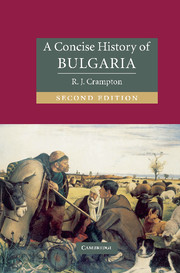Book contents
- Frontmatter
- Contents
- List of illustrations
- Preface
- Preface to the second edition
- Note on transliteration
- The Bulgarian lands: main rivers and mountains
- 1 THE BULGARIAN LANDS FROM PREHISTORY TO THE ARRIVAL OF THE BULGARIANS
- 2 MEDIAEVAL BULGARIA, 681–1393
- 3 OTTOMAN RULE IN THE BULGARIAN LANDS
- 4 THE NATIONAL REVIVAL AND THE LIBERATION
- 5 THE CONSOLIDATION OF THE BULGARIAN STATE, 1878–1896
- 6 FERDINAND'S PERSONAL RULE, 1896–1918
- 7 BULGARIA, 1918–1944
- 8 BULGARIA UNDER COMMUNIST RULE, 1944–1989
- 9 POST-COMMUNIST BULGARIA
- CONCLUSION
- Appendix 1 Bulgarian monarchs
- Appendix 2 Prime ministers of Bulgaria, 1879–2004
- Suggestions for further reading
- Index
- CAMBRIDGE CONCISE HISTORIES
8 - BULGARIA UNDER COMMUNIST RULE, 1944–1989
Published online by Cambridge University Press: 05 June 2012
- Frontmatter
- Contents
- List of illustrations
- Preface
- Preface to the second edition
- Note on transliteration
- The Bulgarian lands: main rivers and mountains
- 1 THE BULGARIAN LANDS FROM PREHISTORY TO THE ARRIVAL OF THE BULGARIANS
- 2 MEDIAEVAL BULGARIA, 681–1393
- 3 OTTOMAN RULE IN THE BULGARIAN LANDS
- 4 THE NATIONAL REVIVAL AND THE LIBERATION
- 5 THE CONSOLIDATION OF THE BULGARIAN STATE, 1878–1896
- 6 FERDINAND'S PERSONAL RULE, 1896–1918
- 7 BULGARIA, 1918–1944
- 8 BULGARIA UNDER COMMUNIST RULE, 1944–1989
- 9 POST-COMMUNIST BULGARIA
- CONCLUSION
- Appendix 1 Bulgarian monarchs
- Appendix 2 Prime ministers of Bulgaria, 1879–2004
- Suggestions for further reading
- Index
- CAMBRIDGE CONCISE HISTORIES
Summary
THE COMMUNIST TAKEOVER, 1944–1947
Although the communists dominated the Fatherland Front government from the start, a monolithic, one-party system was not imposed until the end of 1947.
In their rise to power the communists, still operating as the Bulgarian Workers' Party (BWP), were helped by a number of factors. They were, initially at least, extremely popular, especially amongst the influential urban intelligentsia; that their membership grew from 15,000 in October 1944 to 250,000 a year later was not entirely due to careerism and opportunism on the part of the new members. Their close association with Russia also helped them; the traditional russophilia of the majority of the Bulgarians could not but be intensified in the months immediately after the expulsion of the Germans, months during which the full horrors of Nazi rule in Europe first became known. The fact that the war was to continue for eight months after September 1944 also helped the communists because the western allies had little time to spare for Bulgaria; the Soviets were given the permanent chairmanship of the Allied Control Commission (ACC) which was to oversee internal Bulgarian affairs until the conclusion of a peace treaty. And until then the Red Army was to remain in Bulgaria, another factor which certainly did not militate against the communists.
The communists had a sharp nose for political power. One of their first acts was to place political commissars alongside serving officers in the armies fighting with Tolbukhin.
- Type
- Chapter
- Information
- A Concise History of Bulgaria , pp. 180 - 211Publisher: Cambridge University PressPrint publication year: 2005

